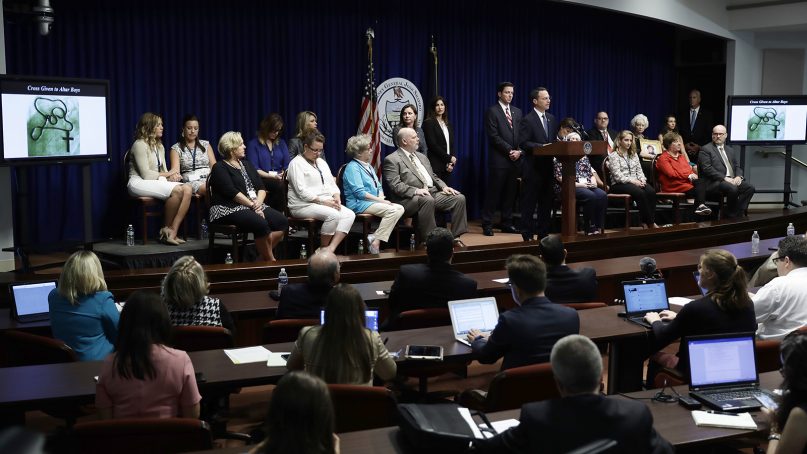PHILADELPHIA (AP) — Parents of children in the Roman Catholic Church and survivors of sexual abuse by clergy filed a lawsuit against Pennsylvania’s eight dioceses and their bishops, asking a judge to compel them to release information about abuse allegations.
The lawsuit filed Monday (Sept. 17) in Pittsburgh comes a month after a statewide grand jury report detailed sexual abuse allegations against more than 300 priests over decades in six of the state’s dioceses. The lawsuit alleges the dioceses haven’t met their obligations to report child sexual abusers under state law.
Benjamin Sweet, an attorney for the lead plaintiffs, said they are not seeking money but instead are asking for public transparency about allegations. Many victims who came forward to talk to the grand jury fall outside the statute of limitations to file a civil personal injury lawsuit. The lawsuit filed Monday doesn’t seek damages and doesn’t represent solely victims of abuse, so Sweet said it isn’t prohibited by any statute of limitations.
“From our perspective this is completely about disclosure and coming clean and allowing these predator priests to be named. The concealment of these priests is a continuing slap in the face to these survivors. It’s a continuing slap in the face to the parents who trust these churches and institutions to educate these children,” he said.
The lawsuit asks for injunctive relief to compel the dioceses to be better mandated reporters for child sexual abuse allegations. It also asks to compel the dioceses to release all information they had given to the grand jury to the public and to provide a mechanism for reporters to review records to make sure their allegations exist, are accurate and have been sent to the proper law enforcement or government officials.
Spokespeople for several of the state’s dioceses said they could not comment on the lawsuit since they had not seen it. Messages left at several other dioceses Monday were not immediately returned.
Spokesmen for the Greensburg, Pittsburgh and Allentown dioceses reiterated their written responses to the grand jury report, saying all allegations of abuse of minors are reported to law enforcement.
“At the Diocese of Greensburg, any and every allegation, regardless of credibility, is immediately called in to Pennsylvania ChildLine and reported to the appropriate district attorney, whether the allegation is minutes old or 70 years old,” Greensburg Diocese spokesman Jerry Zufelt said.
The lawsuit, however, contends that the 20 names of clergy that are still redacted in the grand jury report, along with the fact it says only 10 of the 300 priests named in the report are registered sex offenders under the federal Megan’s Law, lead parents and survivors to believe the dioceses still have not been transparent.
Clergy abuse survivor Ryan O’Connor — one of the lead plaintiffs in the case — said he realized years after his abuse that he needed his faith to be able to heal. His children attend Catholic school, but O’Connor said he would be lying if he said he trusted all of the priests they come into contact with.
“This is not about money or seeking damages. This is about transparency; this is about honesty. This is about letting parents know that we are going to take care of this. This is about the church saying we are going to get rid of these bad operators and we are going to no longer protect them,” O’Connor said. “This is about protecting my kids, their classmates and every child who steps foot into a Catholic school or into Mass as an altar server.”
(Claudia Lauer writes for The Associated Press.)





